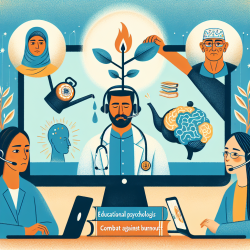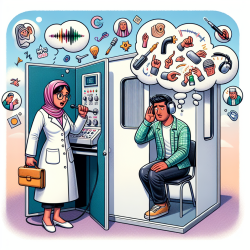Introduction
As a speech-language pathologist with a passion for data-driven decision-making, I am always on the lookout for innovative methods to improve outcomes for children and young adults. A recent study titled "Detecting relapse in youth with psychotic disorders utilizing patient-generated and patient-contributed digital data from Facebook" offers a fascinating glimpse into how social media can be leveraged for mental health monitoring. This research could be a game-changer in early detection and intervention for psychotic relapse in youth.
The Power of Social Media Data
Social media platforms like Facebook have become integral to the daily lives of young people. This study capitalizes on this trend by analyzing Facebook posts to identify linguistic and behavioral markers indicative of psychotic relapse. By examining 52,815 posts from 51 participants, researchers were able to detect significant changes in language and behavior preceding a relapse hospitalization.
Key findings include:
- Increased use of words related to swearing, anger, and death.
- Decreased use of words related to work, friends, and health.
- Increased use of first and second-person pronouns.
- Increased co-tagging and friending behaviors.
These linguistic and behavioral shifts were captured using a one-class classification model, which achieved a specificity of 0.71 in predicting relapse. This demonstrates the potential of machine learning models to make personalized predictions of relapse risk.
Implications for Practitioners
For practitioners, these findings highlight the importance of integrating digital data into mental health assessments. By monitoring social media activity, clinicians can gain valuable insights into a patient's mental state, potentially identifying relapse warning signs before they become clinically apparent. This proactive approach could lead to earlier interventions, reducing the severity and frequency of relapse episodes.
Moreover, this research underscores the need for interdisciplinary collaboration between mental health professionals and data scientists. By working together, these experts can refine predictive models and enhance their clinical utility.
Encouraging Further Research
While the study offers promising results, it also opens the door for further research. Future studies could explore the integration of other digital data sources, such as smartphone sensor data, to enhance predictive accuracy. Additionally, researchers should investigate the specificity of linguistic markers for different mental health conditions, ensuring that models can distinguish between various types of symptom exacerbations.
Conclusion
The intersection of social media and mental health offers exciting opportunities for improving patient outcomes. By embracing digital data, practitioners can adopt a more personalized approach to mental health care, ultimately benefiting the young individuals they serve.
To read the original research paper, please follow this link: Detecting relapse in youth with psychotic disorders utilizing patient-generated and patient-contributed digital data from Facebook.










